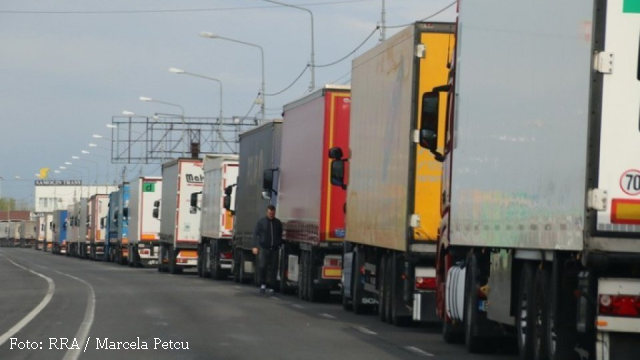Social unrest early in the year
Transporters, farmers and family physicians in Romania have kicked off a series of protests at the beginning of the year

România Internațional, 16.01.2024, 13:50
The year 2023 was marked by social
unrest, which culminated with the strike of the teachers, an event that nearly
compromised the end of the school year in Romania.
2024, an election year in Romania’s European
democracy started off even more abruptly with large-scale protests by local
farmers and transporters, which disrupted traffic close to Romania’s major
cities also causing tensions in the country’s medical system.
Truck drivers have called for a cap to
the mandatory vehicle insurance RCA in Romania and the elimination of double
taxation, as well as for measures of easing traffic at border checkpoints and acknowledging
the economically strategic importance of the road transport sector.
In turn farmers say they are forced
to producing at higher costs and selling at lower prices. They have called for
the urgent payment of subsidies, compensations for the losses they incurred due
to imports from Ukraine and the reintroduction of customs duties for goods
imported from that country. Their representatives have also called for credits
with subsidized interest of maximum 2% and updated state subsidy to diesel
excises.
After long talks with the
representatives of a farmer association, the executive agreed to the urgent
payment of subsidies, compensations for their losses caused by imports from Ukraine,
subsidized credits and updated state subsidy for the diesel excise in
agriculture. Romania’s Prime Minister Marcel Ciolacu earlier told a TV station
that 99% of the farmers’ claims were solved and gave assurances the Ukrainian
grain is no longer sold in Romania, mainly after an agreement between the two
countries was concluded.
As concerns the transporters, talks
are underway on the mandatory vehicle insurance and the diesel excise. However,
he explained that Romania cannot afford any more bankrupted insurance companies
and the risks posed by capping the RCA at a price the insurance companies
cannot afford. Ciolacu has pledged solutions to all the claims made by the
professional transporters but has also drawn attention to the risks posed by
blocking the economy through the aforementioned protests. In another
development, the Prime Minister has given assurances that no family clinic will
be closed down and the value of the subsidized medical services for this
category is under negotiation. The head of the Romanian government has also pleaded
for balance between the wages of physicians from the cities and rural areas.
Disgruntled with the funds the authorities have earmarked to a series of
medical services, family physicians and employees of the specialized ambulatory
care facilities have commenced a series of protests. Their viewpoint has been
backed by the trade unions in the field, which say that trimming the budget of
the family medicine clinics will have a bad effect on the entire healthcare
system.
(bill)






























